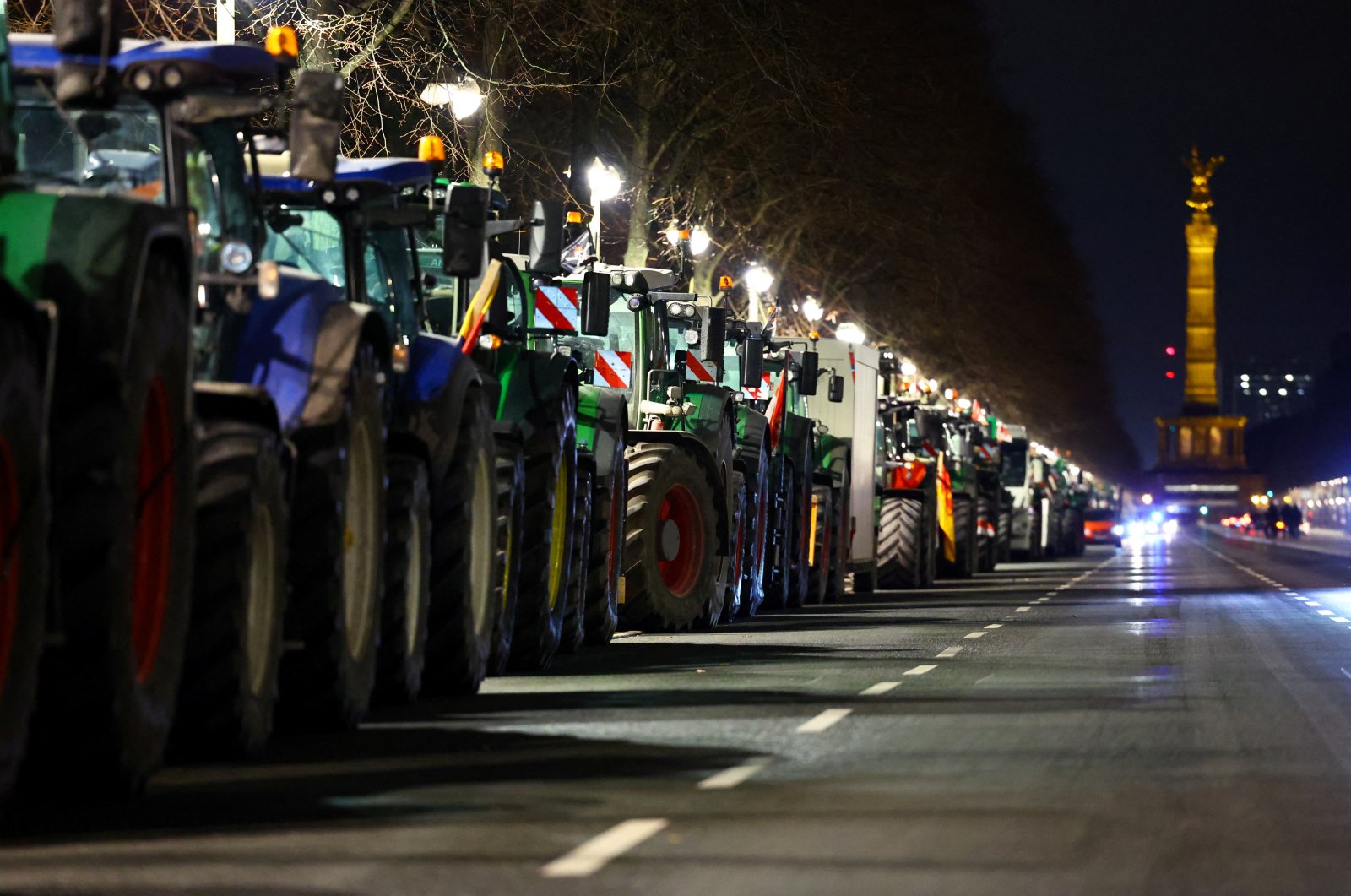
German farmers blocked yesterday the highway access roads in several parts of the country and converged for demonstrations, kicking off weeklong protests over a government plan to eliminate tax benefits on diesel used in agriculture.
Chancellor Olaf Scholz's unpopular three-party coalition infuriated farmers last month by drawing up plans to abolish a car tax exemption for farming vehicles and the diesel tax breaks. The proposals were part of a package to fill a 17 billion euro ($18.6 billion) hole in the 2024 budget.
The government on Thursday climbed down partially, saying that the car tax exemption would be retained and the cuts in the diesel tax breaks would be staggered over three years. But the German Farmers' Association (DBV) said it was still insisting on the plans being reversed fully and would go ahead with a "week of action” starting Monday.
In some areas, farmers used tractors to block entry roads to highways early Monday. A protest was planned in front of the Brandenburg Gate in Berlin, and a string of other demonstrations with tractors were planned across the country.
The protests are under scrutiny after a group of farmers on Thursday prevented Vice Chancellor Robert Habeck from disembarking a ferry in a small North Sea port as he returned from a personal trip to an offshore island.
That incident drew condemnation from government and opposition figures and the farmers association. Authorities have warned that far-right groups and others could try to capitalize on the protests.
Farmers association chairman Joachim Rukwied told RBB Inforadio Monday that "we will ensure we are not infiltrated" by such groups. Of the government's partial climbdown, Rukwied said: "This is absolutely insufficient. We can't carry this additional tax burden."
Police said roads and highway slip roads were blocked in multiple locations nationwide, including several border crossings with France, causing traffic jams during the morning rush hour.
The budget revamp that included the disputed cuts was required after Germany’s highest court annulled an earlier decision to repurpose 60 billion euros (almost $66 billion) originally meant to cushion the fallout from the COVID-19 pandemic for measures to help combat climate change and modernize the country. The maneuver fell afoul of Germany’s strict self-imposed limits on running up debt.
However, farmers argue the burden of these cuts has been unfairly placed on them, and have vowed to blockade major traffic and logistics routes for a week, saying that an end to tax breaks will drive farms out of business.
A poll conducted by public broadcaster ntv showed strong public backing for the protests, with 91% of respondents saying they were justified.
The farmers' backlash last week prompted Chancellor Olaf Scholz's coalition to make unexpected changes to the budget, including modifying plans to cut subsidies for agriculture.
Rather than abruptly ending the farmers' tax break on agricultural diesel, the subsidy will be reduced by 40% this year, by 30% in 2025, and will end in 2026.
Farmers say this does not go far enough, but a government spokesperson said on Monday the government is not considering any further changes.
"In the end, a government has to decide and has to lead the way, and that can't always be to everyone's satisfaction," the spokesperson said.
The opposition AfD party, hoping for major gains in a string of state elections this year, backs the farmers' protest.
"The German government is forgetting the many difficult consequences of its policy of deindustrialization," an AfD spokesperson said in a statement, adding that the AfD was "ready to take responsibility" in the interests of the people.
However, the head of the German farmers' association has expressed concern that far-right activists may exploit the protests for their own ends.
The AfD has grown from an anti-euro party in the wake of the European debt crisis to a major opposition force fuelled by anti-migration rhetoric.
The party is currently polling at 23%, according to the weekly INSA poll, comfortably ahead of Scholz's Social Democrats and his two coalition partners, the Greens and the Free Democrats. The conservative Christian Democrat opposition has 31% support.
On top of potential disruption caused by the farmers' protests, travelers in Germany face a nearly three-day strike later this week by a union representing many of the country's train drivers, which is stepping up its action against state-owned railway operator Deutsche Bahn in an unrelated dispute over working hours and pay.
The GDL union is calling on its members to walk out from 2 a.m. Wednesday until 6 p.m. Friday.
